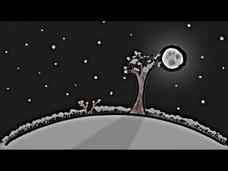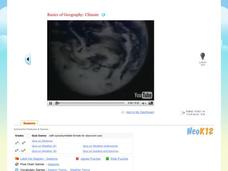MinutePhysics
Why The Full Moon is Better in Winter
Did you ever wonder which season is best for viewing the full moon? Find out why winter wins the honor, and why the tilt of Earth''s axis is the main contributor.
Curated OER
Basics of Geography: Climate
What's the weather going to be like tomorrow? The answer depends on your place on the planet. An informative video discusses how factors such as elevation, location, precipitation, and wind can determine an area's climate. It focuses on...
PBS
The Sun and Planets
Do other planets experience night, day, and the seasons like humans do here on Earth? Examine planetary motion using real images of the planets through a simulation from PBS's Space lesson series. After observing the motion of each...
Physics Girl
This Phenomenon Only Happens in Hawaii ... and Cuba, Nigeria, Indonesia, Peru, Sudan, Laos and…
What do Hawaii, Nigeria, and Peru have in common? Each of these locations, plus many others, get to see the subsolar point! But, what is it? A video from a comprehensive physics playlist puts the phenomenon at the forefront by explaining...
Physics Girl
Craziest Eclipses in the Solar System
Have you ever wondered what a solar eclipse looks like ... on Mars? Explore eclipses throughout the solar system with a video from a comprehensive playlist that covers many physics concepts. With images and conceptual drawings, viewers...
PBS
The Calendar, Australia, and White Christmas
Could a white Christmas in July ever actually happen? PBS's series on space time and measurement presents a video discussing how our ideas about the seasons won't hold true forever! The narrator explains how Earth's gyroscopic behavior...
PBS
The Four Seasons | All About the Holidays
Winter, spring, summer, and fall—these are the four seasons. But what exactly are seasons and how are they different around the world? Watch a brief video that provides a brief introduction to the four seasons.
Veritasium
What Causes the Seasons?
'Tis the season to be ... hmmm ... why is it that Earth has seasons? Explore the variety of theories, from the atmosphere to the axis in a short, entertaining video. The interview subjects use observation, random earth science terms, and...
Crash Course Kids
Seasons and the Sun
Discover the differences between summer and winter, besides coats and bathing suits, with a short and informative earth science video. Sabrina, the narrator of the animated video, talks about the ways the earth's tilt affects the...
Crash Course Kids
Earth's Rotation and Revolution
Where does the sun go at night? Don't worry, it's just facing the other side of the earth. Learn about Earth's axis, tilt, rotation, revolution, and what all this means for your summer vacation with an engaging earth science video.
Crash Course Kids
Constellation Location
Location, location, location! Learn about why your location on Earth is a determining factor in which constellations you can see at night during different parts of the year.
Scholastic
Study Jams! A Day on Earth
It's good thing that it isn't up to RJ to spin the earth on its axis; he can't even keep a basketball spinning! In this video animation, he and viewers learn about Earth's movements in space. One thing to consider before you use this...











